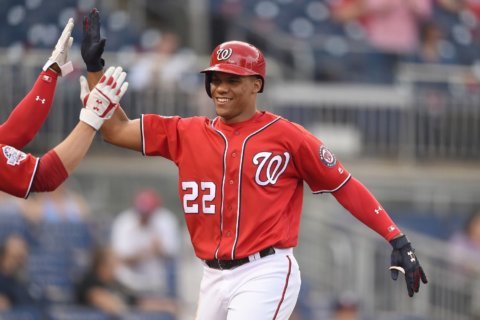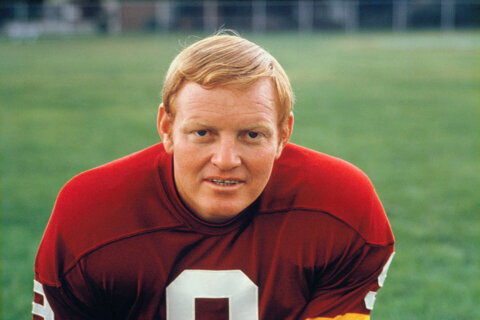WASHINGTON — The Baltimore Orioles are terrible.
You probably knew this before Tuesday night, when they blew a 5-1 lead by yielding not one, but two four-run innings to a Washington Nationals offense that had failed to score four runs in six entire games this month. But it only underscored just how lost this season — and this era of Baltimore baseball — truly is.
The Orioles are an MLB-worst 20-51. They’ve lost 17 of their last 20. Remember that 1988 team that lost its first 21 games to open the season? After 71 games, they were only a game behind this year’s squad. Based on Baseball Reference’s simple rating system statistic, they are 1.5 runs per game worse than the average MLB team. They’re 9-28 away from Camden Yards, the only team yet to reach a dozen road wins.
After averaging 89 wins from 2012-16, Baltimore won 75 games last year. They are currently on pace to win just 46 games, which would be the worst season in franchise history and the worst in MLB since the 2003 Detroit Tigers, who finished an ungodly 43-119.
If there’s a player who personifies the particular helplessness of Baltimore’s plight, it is undoubtedly Chris Davis. The lefty slugger was a revelation in the Orioles’ 2012 return to the playoffs, swatting 33 home runs. He would average 41 bombs a year over the next four seasons before, along with the O’s, falling off the map.
After a rough 2017, Davis was on pace for the very worst season in baseball history by wins above replacement (already at -2.2 WAR in just 57 games), before getting benched last week. More problematic, he is owed more than $84 million over the next four seasons.
It's pretty frightening to be on an "on-pace-for" the worst season of all-time by a large margin when you're nearing mid-June. Chris Davis's on-pace-for in fWAR would rank him 81892 out of 81892 player-seasons since 1901. By NEARLY A FULL WIN.
— Dan Szymborski (@DSzymborski) June 7, 2018
There’s a lesson to be learned from the Houston Astros here. While their rebuild proved eventually successful, it took the team several years to finally admit that it was going nowhere and offload the bloated contracts of its aging stars, like Lance Berkman, Carlos Lee and Roy Oswalt. The only way for the Orioles to improve for the future is to take stock of the assets they do have, get the most they can for them, and try to find some salary relief from their bad contracts.
Manny Machado will be a free agent at season’s end, as will Adam Jones. Zach Britton, who has just returned to the active roster, will see his contract expire as well. All three are helpful players for contenders who should generate various levels of return for Baltimore (as could Danny Valencia, the only other truly competent hitter in the lineup these days). The O’s should trade all of them, and they shouldn’t wait.
Just as the Nationals signaled on Monday that they weren’t going to sit around until the July 31 non-waiver trade deadline to get better, so should the Orioles start their rebuilding process immediately. There’s added value for trading partners in the extra six weeks of play they will get from adding a player now, rather than at the end of July. That helps offset any boost the O’s might get from a last-minute push for a deal, and ensures that they actually get a long-range return and don’t get stuck holding expiring contracts come August.
While the Orioles could hold out for the best prospect return for Machado, they may well be better served instead looking for a trade partner willing to take on the brunt of the dead weight of Davis’s contract instead. Baltimore’s $150 million 2018 payroll puts them right in the middle of the MLB pack, but Davis is easily the biggest salary under contract heading into next year. The O’s could dump more than 30 percent of the $67 million they have committed to contracts next year if they could offload Davis.
While the Marlins (rightfully) drew the ire of baseball fans everywhere for dumping Giancarlo Stanton for basically just salary relief in return, this would be a much more prudent option for Baltimore. Stanton was the league MVP last year, leading baseball in home runs, RBI and slugging. He was a 7.6 WAR player. If we consider the average starter in MLB to be a 2-WAR player, Chris Davis has hurt the Orioles almost as much as Giancarlo Stanton helped the Marlins.
There’s also the ever-looming MASN issue. If the television contract dispute between the Beltway rivals is ever resolved at all in the Nats favor, there will be an eight-figure annual revenue shortfall for the Orioles from what they’ve gotten accustomed to receiving. But at the very least, in the meantime it clears space to be more aggressive over the next few years when additions need to be made.
It’s obvious that this season is lost. With the club’s biggest stars likely to leave anyway in free agency, there’s a real opportunity to get a jump start on the necessary rebuilding process and get back to the next competitive window sooner rather than later.






